Global Supply Chain Ethical Issues Analysis and Recommendations Report
VerifiedAdded on 2022/08/29
|25
|5485
|32
Report
AI Summary
This report provides an in-depth analysis of ethical challenges within international supply chains, focusing on three major global corporations: Nestle, KPR Mills, and Pfizer. The report begins with an overview of globalization and international supply chains, emphasizing the complexities and ethical considerations involved. Chapter One examines Nestle's supply chain, highlighting issues such as child labor in cocoa production, unethical marketing strategies, and deforestation related to palm oil plantations. Chapter Two shifts its focus to KPR Mills, exploring ethical issues within its supply chain, including environmental concerns, unethical workforce behavior, and company culture. Chapter Three delves into the ethical challenges faced by Pfizer Pharmaceutical, discussing unethical approval procedures for clinical trials, unethical withdrawal from patent agreements, and overpricing of drugs. The report concludes with a discussion of the findings, offering recommendations for each company to improve its ethical practices and enhance its global supply chain management.

Cover Page
Paraphrase This Document
Need a fresh take? Get an instant paraphrase of this document with our AI Paraphraser
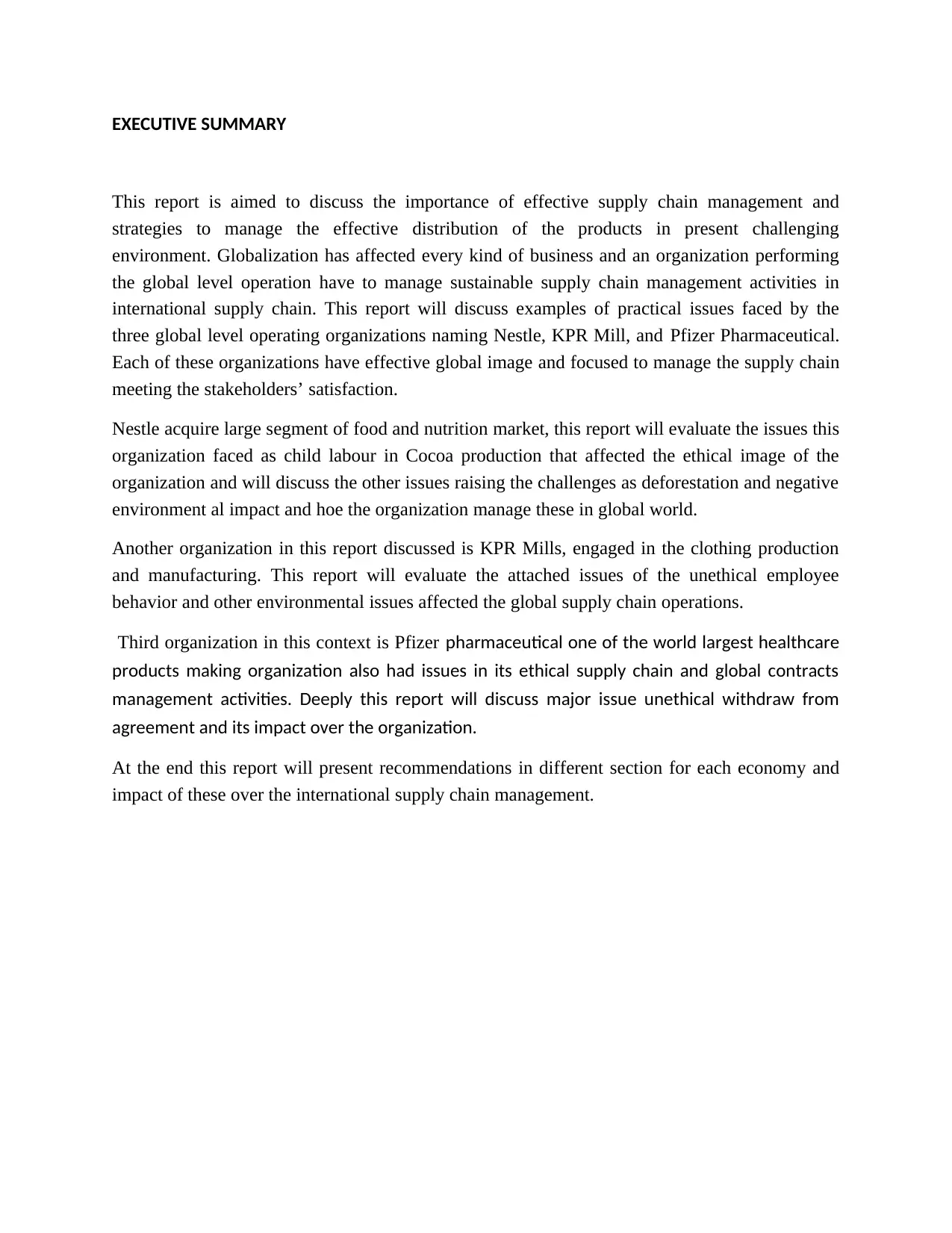
EXECUTIVE SUMMARY
This report is aimed to discuss the importance of effective supply chain management and
strategies to manage the effective distribution of the products in present challenging
environment. Globalization has affected every kind of business and an organization performing
the global level operation have to manage sustainable supply chain management activities in
international supply chain. This report will discuss examples of practical issues faced by the
three global level operating organizations naming Nestle, KPR Mill, and Pfizer Pharmaceutical.
Each of these organizations have effective global image and focused to manage the supply chain
meeting the stakeholders’ satisfaction.
Nestle acquire large segment of food and nutrition market, this report will evaluate the issues this
organization faced as child labour in Cocoa production that affected the ethical image of the
organization and will discuss the other issues raising the challenges as deforestation and negative
environment al impact and hoe the organization manage these in global world.
Another organization in this report discussed is KPR Mills, engaged in the clothing production
and manufacturing. This report will evaluate the attached issues of the unethical employee
behavior and other environmental issues affected the global supply chain operations.
Third organization in this context is Pfizer pharmaceutical one of the world largest healthcare
products making organization also had issues in its ethical supply chain and global contracts
management activities. Deeply this report will discuss major issue unethical withdraw from
agreement and its impact over the organization.
At the end this report will present recommendations in different section for each economy and
impact of these over the international supply chain management.
This report is aimed to discuss the importance of effective supply chain management and
strategies to manage the effective distribution of the products in present challenging
environment. Globalization has affected every kind of business and an organization performing
the global level operation have to manage sustainable supply chain management activities in
international supply chain. This report will discuss examples of practical issues faced by the
three global level operating organizations naming Nestle, KPR Mill, and Pfizer Pharmaceutical.
Each of these organizations have effective global image and focused to manage the supply chain
meeting the stakeholders’ satisfaction.
Nestle acquire large segment of food and nutrition market, this report will evaluate the issues this
organization faced as child labour in Cocoa production that affected the ethical image of the
organization and will discuss the other issues raising the challenges as deforestation and negative
environment al impact and hoe the organization manage these in global world.
Another organization in this report discussed is KPR Mills, engaged in the clothing production
and manufacturing. This report will evaluate the attached issues of the unethical employee
behavior and other environmental issues affected the global supply chain operations.
Third organization in this context is Pfizer pharmaceutical one of the world largest healthcare
products making organization also had issues in its ethical supply chain and global contracts
management activities. Deeply this report will discuss major issue unethical withdraw from
agreement and its impact over the organization.
At the end this report will present recommendations in different section for each economy and
impact of these over the international supply chain management.
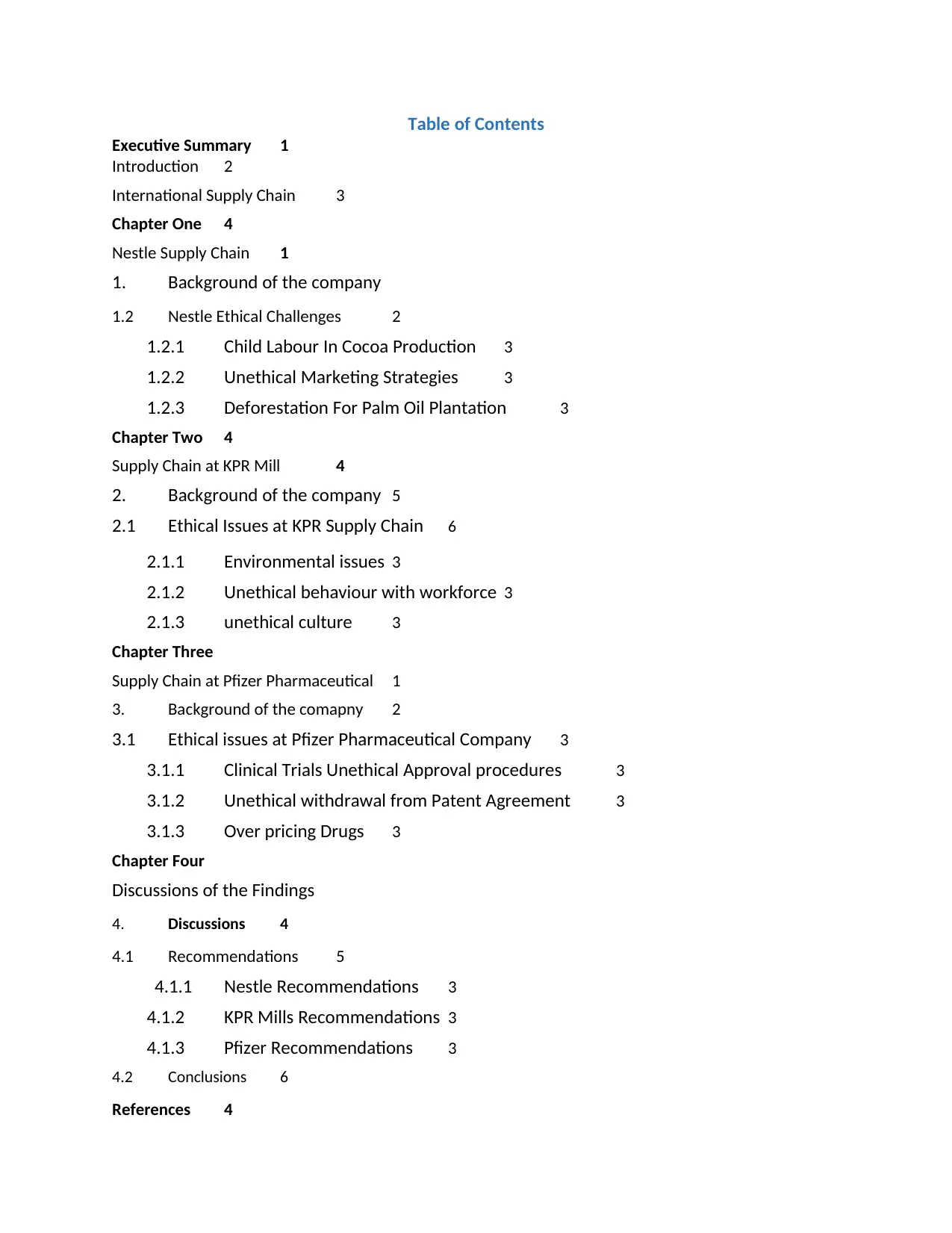
Table of Contents
Executive Summary 1
Introduction 2
International Supply Chain 3
Chapter One 4
Nestle Supply Chain 1
1. Background of the company
1.2 Nestle Ethical Challenges 2
1.2.1 Child Labour In Cocoa Production 3
1.2.2 Unethical Marketing Strategies 3
1.2.3 Deforestation For Palm Oil Plantation 3
Chapter Two 4
Supply Chain at KPR Mill 4
2. Background of the company 5
2.1 Ethical Issues at KPR Supply Chain 6
2.1.1 Environmental issues 3
2.1.2 Unethical behaviour with workforce 3
2.1.3 unethical culture 3
Chapter Three
Supply Chain at Pfizer Pharmaceutical 1
3. Background of the comapny 2
3.1 Ethical issues at Pfizer Pharmaceutical Company 3
3.1.1 Clinical Trials Unethical Approval procedures 3
3.1.2 Unethical withdrawal from Patent Agreement 3
3.1.3 Over pricing Drugs 3
Chapter Four
Discussions of the Findings
4. Discussions 4
4.1 Recommendations 5
4.1.1 Nestle Recommendations 3
4.1.2 KPR Mills Recommendations 3
4.1.3 Pfizer Recommendations 3
4.2 Conclusions 6
References 4
Executive Summary 1
Introduction 2
International Supply Chain 3
Chapter One 4
Nestle Supply Chain 1
1. Background of the company
1.2 Nestle Ethical Challenges 2
1.2.1 Child Labour In Cocoa Production 3
1.2.2 Unethical Marketing Strategies 3
1.2.3 Deforestation For Palm Oil Plantation 3
Chapter Two 4
Supply Chain at KPR Mill 4
2. Background of the company 5
2.1 Ethical Issues at KPR Supply Chain 6
2.1.1 Environmental issues 3
2.1.2 Unethical behaviour with workforce 3
2.1.3 unethical culture 3
Chapter Three
Supply Chain at Pfizer Pharmaceutical 1
3. Background of the comapny 2
3.1 Ethical issues at Pfizer Pharmaceutical Company 3
3.1.1 Clinical Trials Unethical Approval procedures 3
3.1.2 Unethical withdrawal from Patent Agreement 3
3.1.3 Over pricing Drugs 3
Chapter Four
Discussions of the Findings
4. Discussions 4
4.1 Recommendations 5
4.1.1 Nestle Recommendations 3
4.1.2 KPR Mills Recommendations 3
4.1.3 Pfizer Recommendations 3
4.2 Conclusions 6
References 4
⊘ This is a preview!⊘
Do you want full access?
Subscribe today to unlock all pages.

Trusted by 1+ million students worldwide
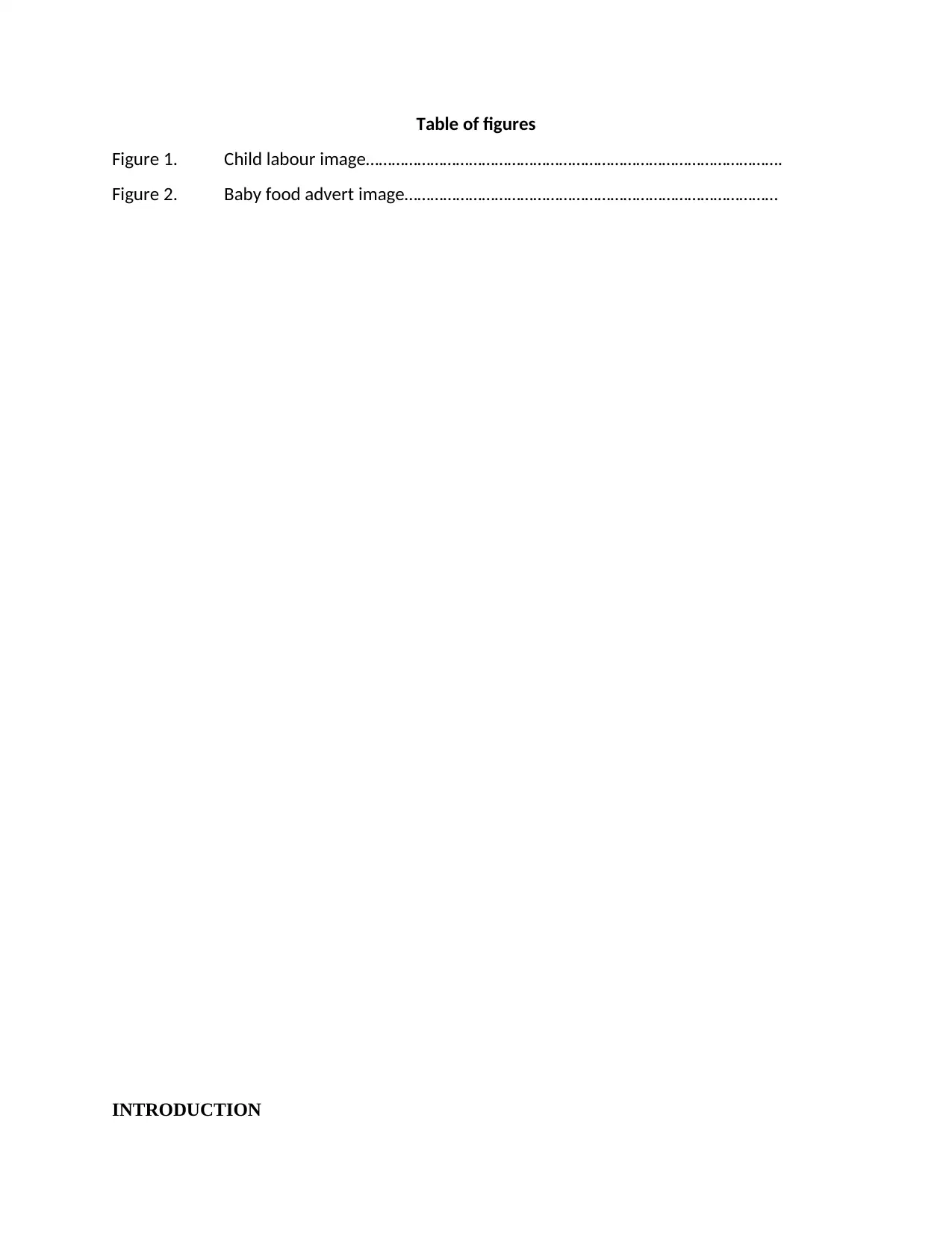
Table of figures
Figure 1. Child labour image…………………………………………………………………………………….
Figure 2. Baby food advert image……………………………………………………………………………
INTRODUCTION
Figure 1. Child labour image…………………………………………………………………………………….
Figure 2. Baby food advert image……………………………………………………………………………
INTRODUCTION
Paraphrase This Document
Need a fresh take? Get an instant paraphrase of this document with our AI Paraphraser
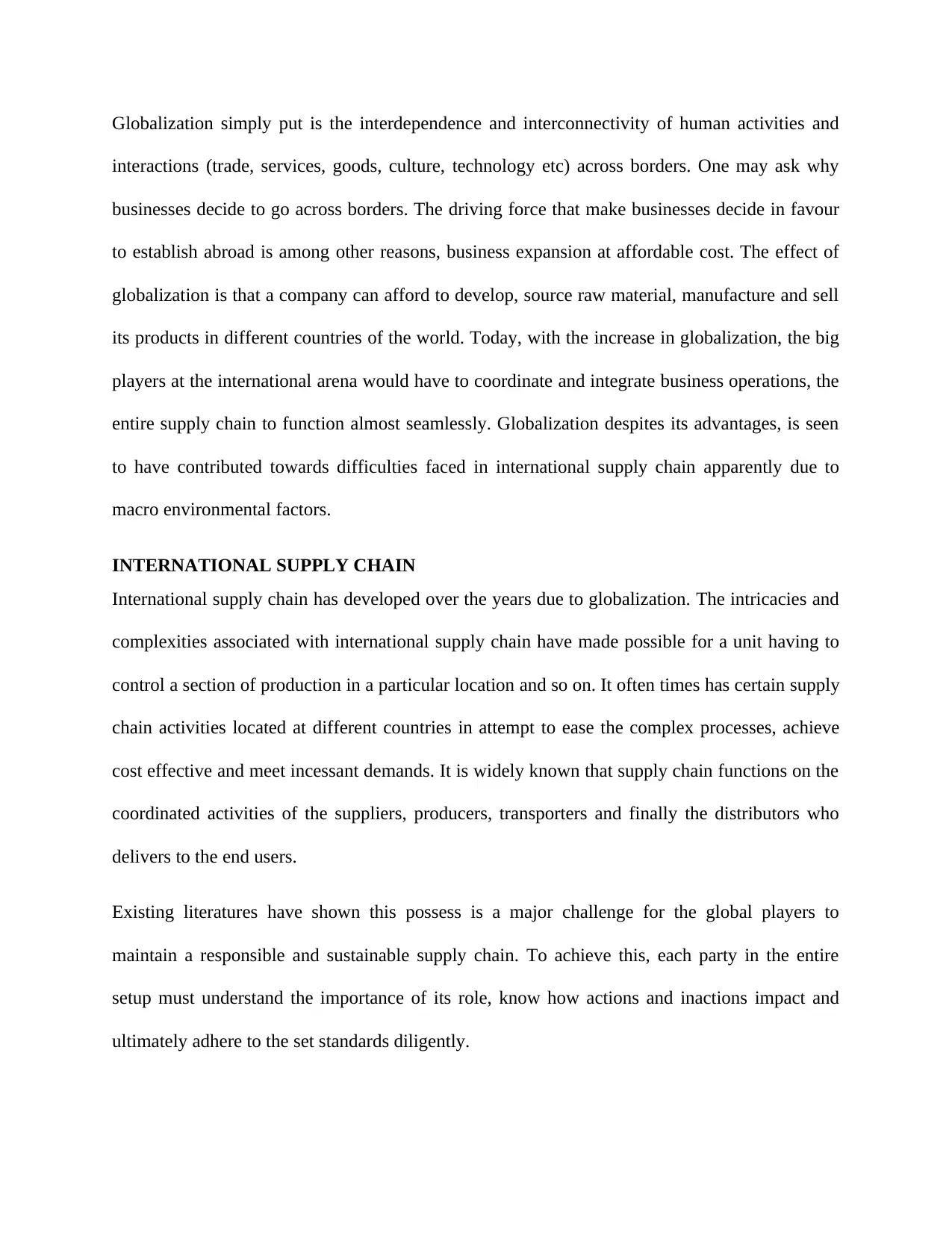
Globalization simply put is the interdependence and interconnectivity of human activities and
interactions (trade, services, goods, culture, technology etc) across borders. One may ask why
businesses decide to go across borders. The driving force that make businesses decide in favour
to establish abroad is among other reasons, business expansion at affordable cost. The effect of
globalization is that a company can afford to develop, source raw material, manufacture and sell
its products in different countries of the world. Today, with the increase in globalization, the big
players at the international arena would have to coordinate and integrate business operations, the
entire supply chain to function almost seamlessly. Globalization despites its advantages, is seen
to have contributed towards difficulties faced in international supply chain apparently due to
macro environmental factors.
INTERNATIONAL SUPPLY CHAIN
International supply chain has developed over the years due to globalization. The intricacies and
complexities associated with international supply chain have made possible for a unit having to
control a section of production in a particular location and so on. It often times has certain supply
chain activities located at different countries in attempt to ease the complex processes, achieve
cost effective and meet incessant demands. It is widely known that supply chain functions on the
coordinated activities of the suppliers, producers, transporters and finally the distributors who
delivers to the end users.
Existing literatures have shown this possess is a major challenge for the global players to
maintain a responsible and sustainable supply chain. To achieve this, each party in the entire
setup must understand the importance of its role, know how actions and inactions impact and
ultimately adhere to the set standards diligently.
interactions (trade, services, goods, culture, technology etc) across borders. One may ask why
businesses decide to go across borders. The driving force that make businesses decide in favour
to establish abroad is among other reasons, business expansion at affordable cost. The effect of
globalization is that a company can afford to develop, source raw material, manufacture and sell
its products in different countries of the world. Today, with the increase in globalization, the big
players at the international arena would have to coordinate and integrate business operations, the
entire supply chain to function almost seamlessly. Globalization despites its advantages, is seen
to have contributed towards difficulties faced in international supply chain apparently due to
macro environmental factors.
INTERNATIONAL SUPPLY CHAIN
International supply chain has developed over the years due to globalization. The intricacies and
complexities associated with international supply chain have made possible for a unit having to
control a section of production in a particular location and so on. It often times has certain supply
chain activities located at different countries in attempt to ease the complex processes, achieve
cost effective and meet incessant demands. It is widely known that supply chain functions on the
coordinated activities of the suppliers, producers, transporters and finally the distributors who
delivers to the end users.
Existing literatures have shown this possess is a major challenge for the global players to
maintain a responsible and sustainable supply chain. To achieve this, each party in the entire
setup must understand the importance of its role, know how actions and inactions impact and
ultimately adhere to the set standards diligently.
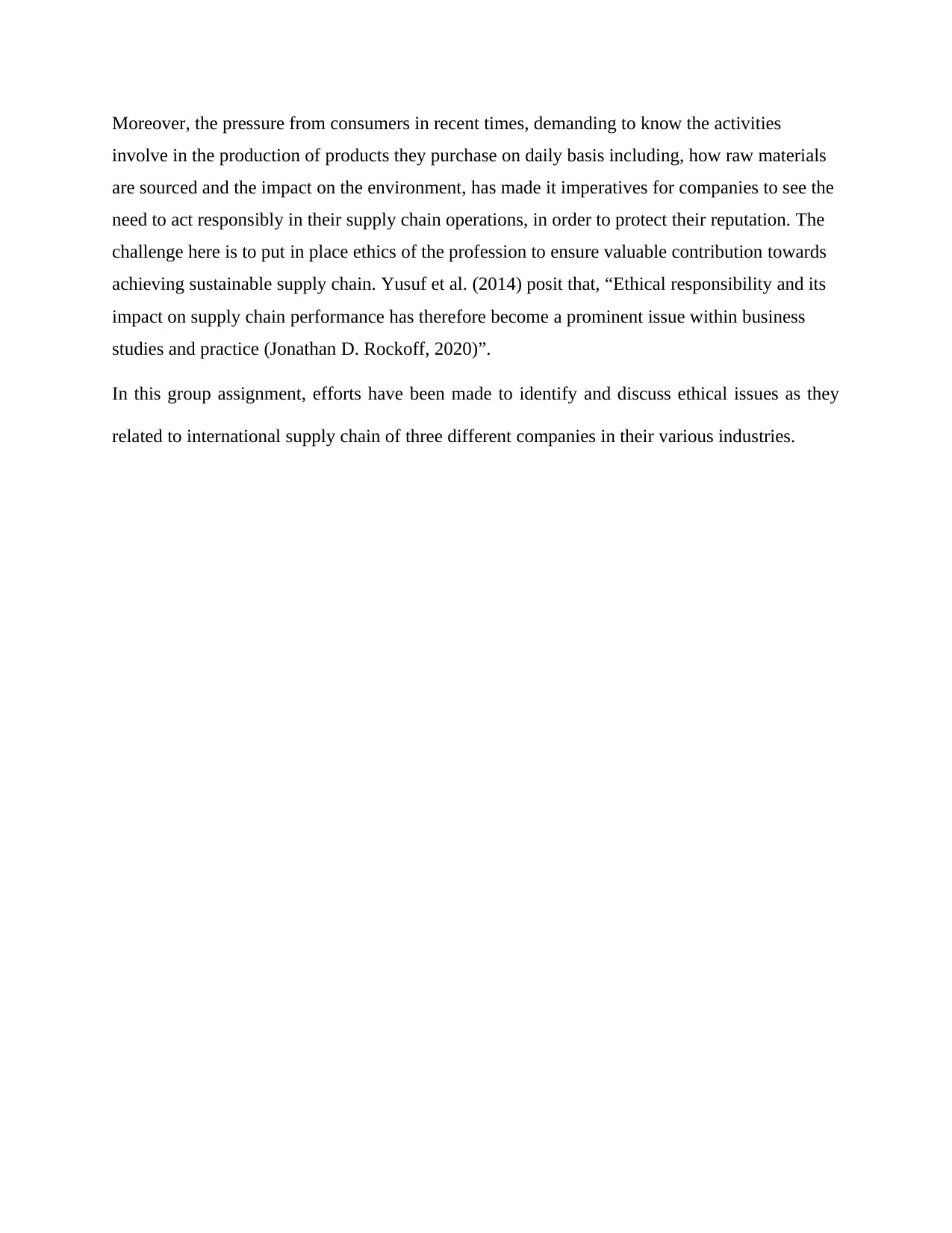
Moreover, the pressure from consumers in recent times, demanding to know the activities
involve in the production of products they purchase on daily basis including, how raw materials
are sourced and the impact on the environment, has made it imperatives for companies to see the
need to act responsibly in their supply chain operations, in order to protect their reputation. The
challenge here is to put in place ethics of the profession to ensure valuable contribution towards
achieving sustainable supply chain. Yusuf et al. (2014) posit that, “Ethical responsibility and its
impact on supply chain performance has therefore become a prominent issue within business
studies and practice (Jonathan D. Rockoff, 2020)”.
In this group assignment, efforts have been made to identify and discuss ethical issues as they
related to international supply chain of three different companies in their various industries.
involve in the production of products they purchase on daily basis including, how raw materials
are sourced and the impact on the environment, has made it imperatives for companies to see the
need to act responsibly in their supply chain operations, in order to protect their reputation. The
challenge here is to put in place ethics of the profession to ensure valuable contribution towards
achieving sustainable supply chain. Yusuf et al. (2014) posit that, “Ethical responsibility and its
impact on supply chain performance has therefore become a prominent issue within business
studies and practice (Jonathan D. Rockoff, 2020)”.
In this group assignment, efforts have been made to identify and discuss ethical issues as they
related to international supply chain of three different companies in their various industries.
⊘ This is a preview!⊘
Do you want full access?
Subscribe today to unlock all pages.

Trusted by 1+ million students worldwide
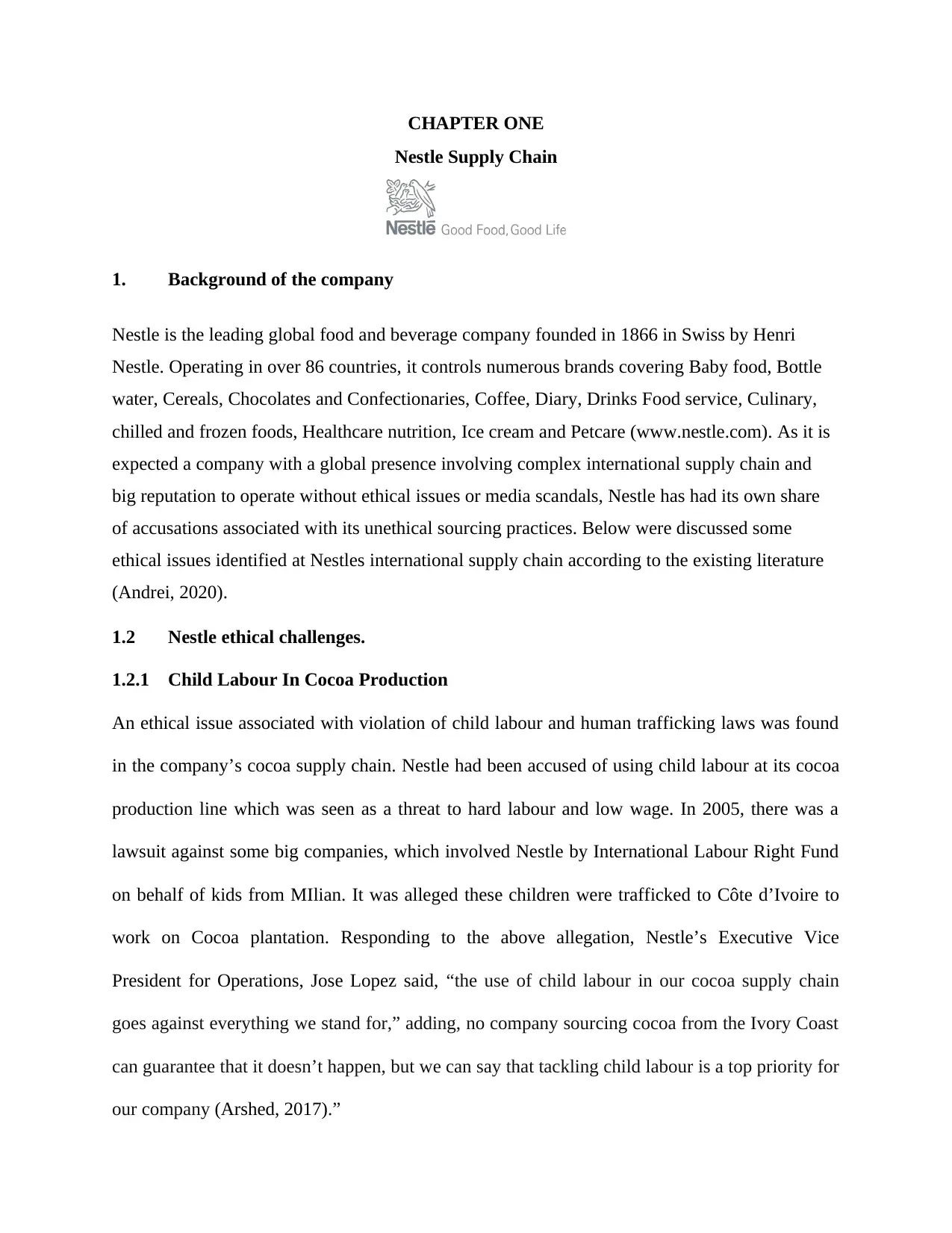
CHAPTER ONE
Nestle Supply Chain
1. Background of the company
Nestle is the leading global food and beverage company founded in 1866 in Swiss by Henri
Nestle. Operating in over 86 countries, it controls numerous brands covering Baby food, Bottle
water, Cereals, Chocolates and Confectionaries, Coffee, Diary, Drinks Food service, Culinary,
chilled and frozen foods, Healthcare nutrition, Ice cream and Petcare (www.nestle.com). As it is
expected a company with a global presence involving complex international supply chain and
big reputation to operate without ethical issues or media scandals, Nestle has had its own share
of accusations associated with its unethical sourcing practices. Below were discussed some
ethical issues identified at Nestles international supply chain according to the existing literature
(Andrei, 2020).
1.2 Nestle ethical challenges.
1.2.1 Child Labour In Cocoa Production
An ethical issue associated with violation of child labour and human trafficking laws was found
in the company’s cocoa supply chain. Nestle had been accused of using child labour at its cocoa
production line which was seen as a threat to hard labour and low wage. In 2005, there was a
lawsuit against some big companies, which involved Nestle by International Labour Right Fund
on behalf of kids from MIlian. It was alleged these children were trafficked to Côte d’Ivoire to
work on Cocoa plantation. Responding to the above allegation, Nestle’s Executive Vice
President for Operations, Jose Lopez said, “the use of child labour in our cocoa supply chain
goes against everything we stand for,” adding, no company sourcing cocoa from the Ivory Coast
can guarantee that it doesn’t happen, but we can say that tackling child labour is a top priority for
our company (Arshed, 2017).”
Nestle Supply Chain
1. Background of the company
Nestle is the leading global food and beverage company founded in 1866 in Swiss by Henri
Nestle. Operating in over 86 countries, it controls numerous brands covering Baby food, Bottle
water, Cereals, Chocolates and Confectionaries, Coffee, Diary, Drinks Food service, Culinary,
chilled and frozen foods, Healthcare nutrition, Ice cream and Petcare (www.nestle.com). As it is
expected a company with a global presence involving complex international supply chain and
big reputation to operate without ethical issues or media scandals, Nestle has had its own share
of accusations associated with its unethical sourcing practices. Below were discussed some
ethical issues identified at Nestles international supply chain according to the existing literature
(Andrei, 2020).
1.2 Nestle ethical challenges.
1.2.1 Child Labour In Cocoa Production
An ethical issue associated with violation of child labour and human trafficking laws was found
in the company’s cocoa supply chain. Nestle had been accused of using child labour at its cocoa
production line which was seen as a threat to hard labour and low wage. In 2005, there was a
lawsuit against some big companies, which involved Nestle by International Labour Right Fund
on behalf of kids from MIlian. It was alleged these children were trafficked to Côte d’Ivoire to
work on Cocoa plantation. Responding to the above allegation, Nestle’s Executive Vice
President for Operations, Jose Lopez said, “the use of child labour in our cocoa supply chain
goes against everything we stand for,” adding, no company sourcing cocoa from the Ivory Coast
can guarantee that it doesn’t happen, but we can say that tackling child labour is a top priority for
our company (Arshed, 2017).”
Paraphrase This Document
Need a fresh take? Get an instant paraphrase of this document with our AI Paraphraser
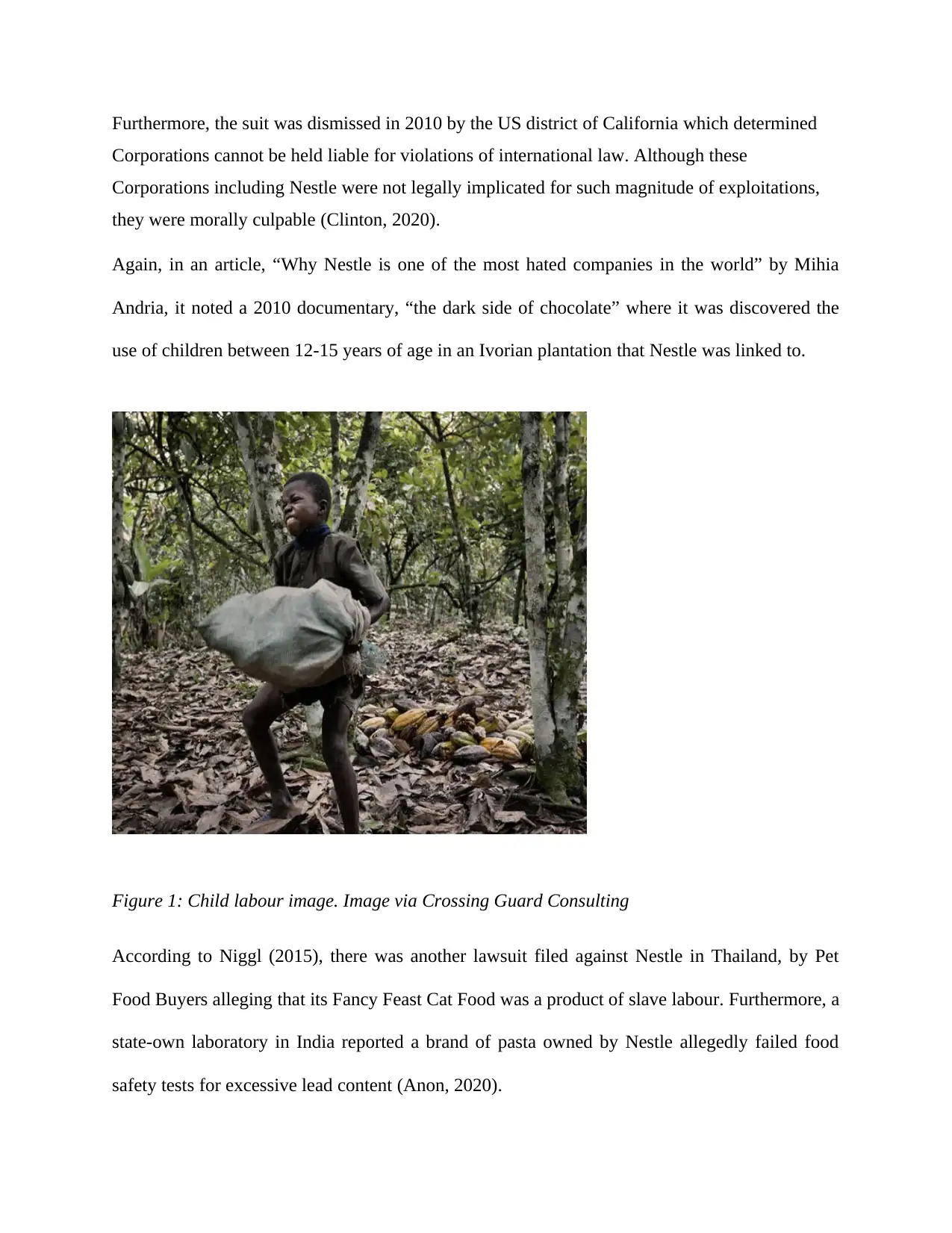
Furthermore, the suit was dismissed in 2010 by the US district of California which determined
Corporations cannot be held liable for violations of international law. Although these
Corporations including Nestle were not legally implicated for such magnitude of exploitations,
they were morally culpable (Clinton, 2020).
Again, in an article, “Why Nestle is one of the most hated companies in the world” by Mihia
Andria, it noted a 2010 documentary, “the dark side of chocolate” where it was discovered the
use of children between 12-15 years of age in an Ivorian plantation that Nestle was linked to.
Figure 1: Child labour image. Image via Crossing Guard Consulting
According to Niggl (2015), there was another lawsuit filed against Nestle in Thailand, by Pet
Food Buyers alleging that its Fancy Feast Cat Food was a product of slave labour. Furthermore, a
state-own laboratory in India reported a brand of pasta owned by Nestle allegedly failed food
safety tests for excessive lead content (Anon, 2020).
Corporations cannot be held liable for violations of international law. Although these
Corporations including Nestle were not legally implicated for such magnitude of exploitations,
they were morally culpable (Clinton, 2020).
Again, in an article, “Why Nestle is one of the most hated companies in the world” by Mihia
Andria, it noted a 2010 documentary, “the dark side of chocolate” where it was discovered the
use of children between 12-15 years of age in an Ivorian plantation that Nestle was linked to.
Figure 1: Child labour image. Image via Crossing Guard Consulting
According to Niggl (2015), there was another lawsuit filed against Nestle in Thailand, by Pet
Food Buyers alleging that its Fancy Feast Cat Food was a product of slave labour. Furthermore, a
state-own laboratory in India reported a brand of pasta owned by Nestle allegedly failed food
safety tests for excessive lead content (Anon, 2020).
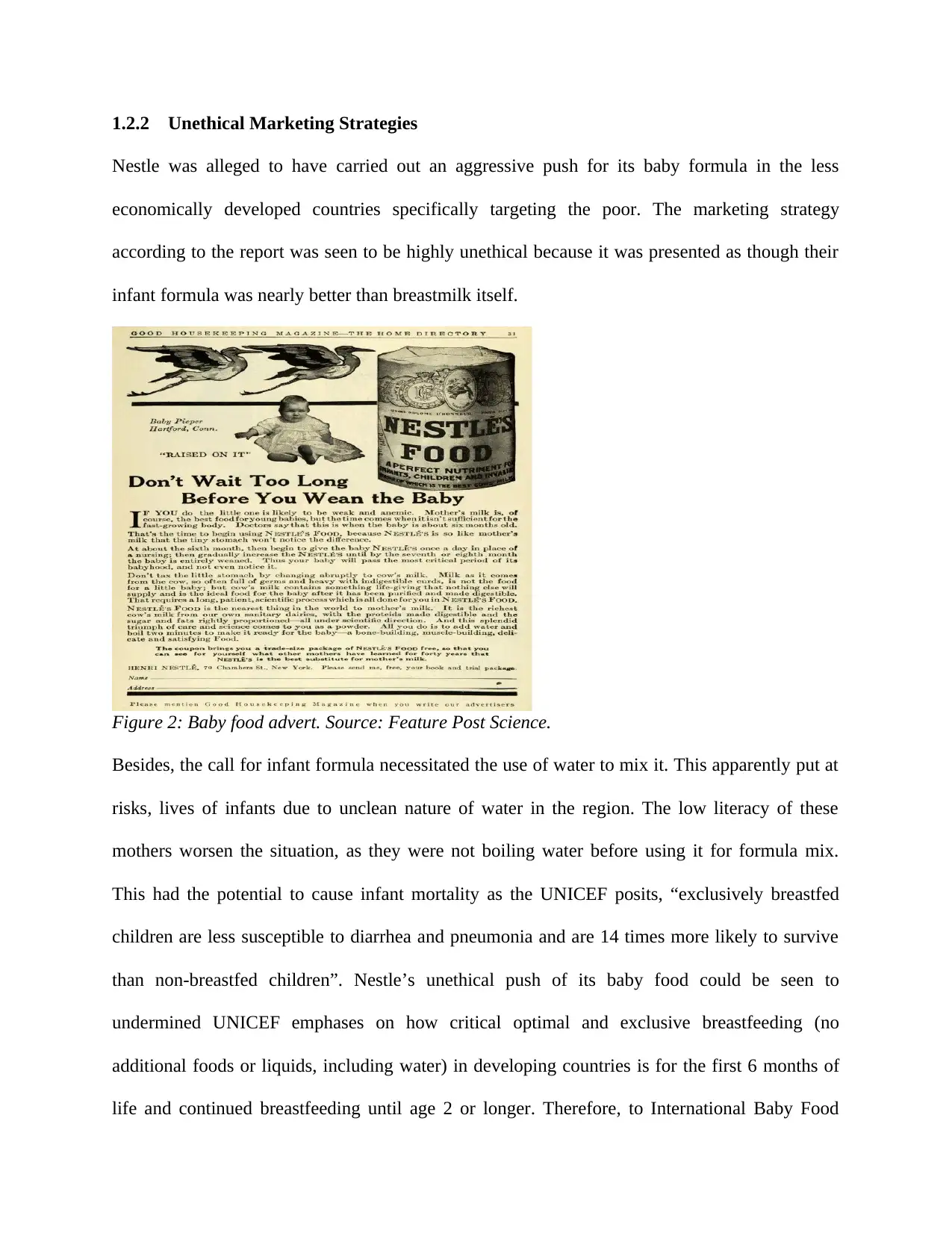
1.2.2 Unethical Marketing Strategies
Nestle was alleged to have carried out an aggressive push for its baby formula in the less
economically developed countries specifically targeting the poor. The marketing strategy
according to the report was seen to be highly unethical because it was presented as though their
infant formula was nearly better than breastmilk itself.
Figure 2: Baby food advert. Source: Feature Post Science.
Besides, the call for infant formula necessitated the use of water to mix it. This apparently put at
risks, lives of infants due to unclean nature of water in the region. The low literacy of these
mothers worsen the situation, as they were not boiling water before using it for formula mix.
This had the potential to cause infant mortality as the UNICEF posits, “exclusively breastfed
children are less susceptible to diarrhea and pneumonia and are 14 times more likely to survive
than non-breastfed children”. Nestle’s unethical push of its baby food could be seen to
undermined UNICEF emphases on how critical optimal and exclusive breastfeeding (no
additional foods or liquids, including water) in developing countries is for the first 6 months of
life and continued breastfeeding until age 2 or longer. Therefore, to International Baby Food
Nestle was alleged to have carried out an aggressive push for its baby formula in the less
economically developed countries specifically targeting the poor. The marketing strategy
according to the report was seen to be highly unethical because it was presented as though their
infant formula was nearly better than breastmilk itself.
Figure 2: Baby food advert. Source: Feature Post Science.
Besides, the call for infant formula necessitated the use of water to mix it. This apparently put at
risks, lives of infants due to unclean nature of water in the region. The low literacy of these
mothers worsen the situation, as they were not boiling water before using it for formula mix.
This had the potential to cause infant mortality as the UNICEF posits, “exclusively breastfed
children are less susceptible to diarrhea and pneumonia and are 14 times more likely to survive
than non-breastfed children”. Nestle’s unethical push of its baby food could be seen to
undermined UNICEF emphases on how critical optimal and exclusive breastfeeding (no
additional foods or liquids, including water) in developing countries is for the first 6 months of
life and continued breastfeeding until age 2 or longer. Therefore, to International Baby Food
⊘ This is a preview!⊘
Do you want full access?
Subscribe today to unlock all pages.

Trusted by 1+ million students worldwide
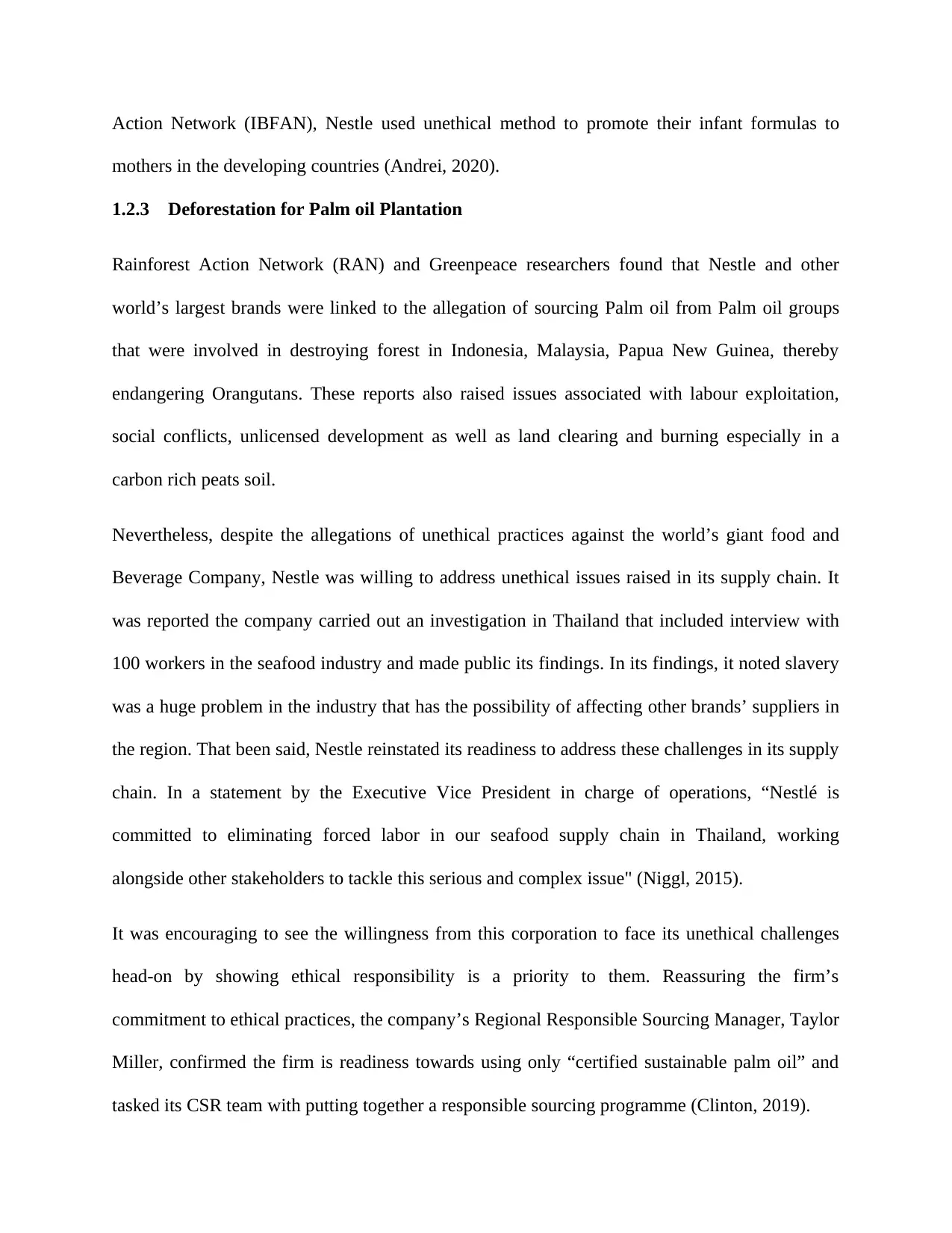
Action Network (IBFAN), Nestle used unethical method to promote their infant formulas to
mothers in the developing countries (Andrei, 2020).
1.2.3 Deforestation for Palm oil Plantation
Rainforest Action Network (RAN) and Greenpeace researchers found that Nestle and other
world’s largest brands were linked to the allegation of sourcing Palm oil from Palm oil groups
that were involved in destroying forest in Indonesia, Malaysia, Papua New Guinea, thereby
endangering Orangutans. These reports also raised issues associated with labour exploitation,
social conflicts, unlicensed development as well as land clearing and burning especially in a
carbon rich peats soil.
Nevertheless, despite the allegations of unethical practices against the world’s giant food and
Beverage Company, Nestle was willing to address unethical issues raised in its supply chain. It
was reported the company carried out an investigation in Thailand that included interview with
100 workers in the seafood industry and made public its findings. In its findings, it noted slavery
was a huge problem in the industry that has the possibility of affecting other brands’ suppliers in
the region. That been said, Nestle reinstated its readiness to address these challenges in its supply
chain. In a statement by the Executive Vice President in charge of operations, “Nestlé is
committed to eliminating forced labor in our seafood supply chain in Thailand, working
alongside other stakeholders to tackle this serious and complex issue" (Niggl, 2015).
It was encouraging to see the willingness from this corporation to face its unethical challenges
head-on by showing ethical responsibility is a priority to them. Reassuring the firm’s
commitment to ethical practices, the company’s Regional Responsible Sourcing Manager, Taylor
Miller, confirmed the firm is readiness towards using only “certified sustainable palm oil” and
tasked its CSR team with putting together a responsible sourcing programme (Clinton, 2019).
mothers in the developing countries (Andrei, 2020).
1.2.3 Deforestation for Palm oil Plantation
Rainforest Action Network (RAN) and Greenpeace researchers found that Nestle and other
world’s largest brands were linked to the allegation of sourcing Palm oil from Palm oil groups
that were involved in destroying forest in Indonesia, Malaysia, Papua New Guinea, thereby
endangering Orangutans. These reports also raised issues associated with labour exploitation,
social conflicts, unlicensed development as well as land clearing and burning especially in a
carbon rich peats soil.
Nevertheless, despite the allegations of unethical practices against the world’s giant food and
Beverage Company, Nestle was willing to address unethical issues raised in its supply chain. It
was reported the company carried out an investigation in Thailand that included interview with
100 workers in the seafood industry and made public its findings. In its findings, it noted slavery
was a huge problem in the industry that has the possibility of affecting other brands’ suppliers in
the region. That been said, Nestle reinstated its readiness to address these challenges in its supply
chain. In a statement by the Executive Vice President in charge of operations, “Nestlé is
committed to eliminating forced labor in our seafood supply chain in Thailand, working
alongside other stakeholders to tackle this serious and complex issue" (Niggl, 2015).
It was encouraging to see the willingness from this corporation to face its unethical challenges
head-on by showing ethical responsibility is a priority to them. Reassuring the firm’s
commitment to ethical practices, the company’s Regional Responsible Sourcing Manager, Taylor
Miller, confirmed the firm is readiness towards using only “certified sustainable palm oil” and
tasked its CSR team with putting together a responsible sourcing programme (Clinton, 2019).
Paraphrase This Document
Need a fresh take? Get an instant paraphrase of this document with our AI Paraphraser

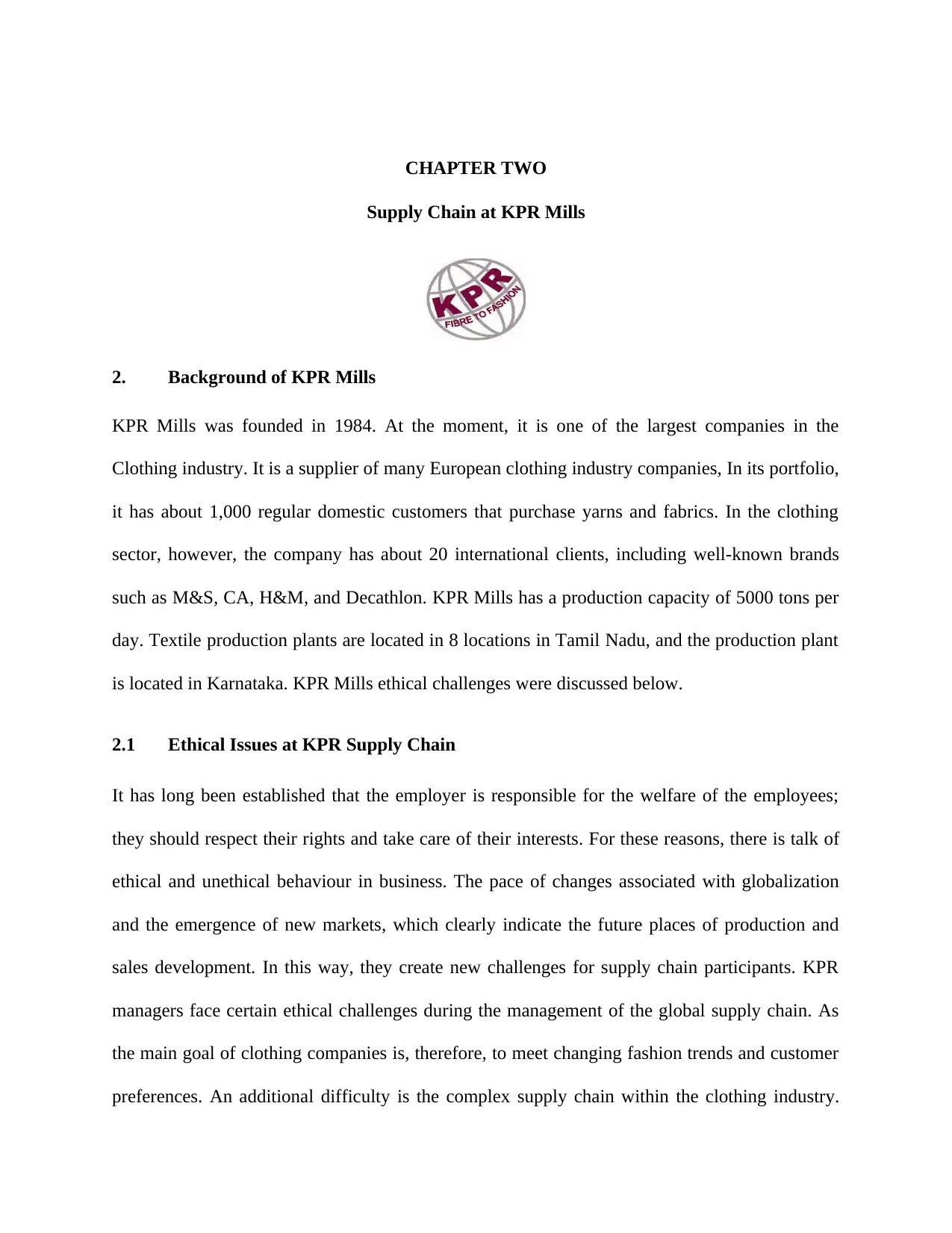
CHAPTER TWO
Supply Chain at KPR Mills
2. Background of KPR Mills
KPR Mills was founded in 1984. At the moment, it is one of the largest companies in the
Clothing industry. It is a supplier of many European clothing industry companies, In its portfolio,
it has about 1,000 regular domestic customers that purchase yarns and fabrics. In the clothing
sector, however, the company has about 20 international clients, including well-known brands
such as M&S, CA, H&M, and Decathlon. KPR Mills has a production capacity of 5000 tons per
day. Textile production plants are located in 8 locations in Tamil Nadu, and the production plant
is located in Karnataka. KPR Mills ethical challenges were discussed below.
2.1 Ethical Issues at KPR Supply Chain
It has long been established that the employer is responsible for the welfare of the employees;
they should respect their rights and take care of their interests. For these reasons, there is talk of
ethical and unethical behaviour in business. The pace of changes associated with globalization
and the emergence of new markets, which clearly indicate the future places of production and
sales development. In this way, they create new challenges for supply chain participants. KPR
managers face certain ethical challenges during the management of the global supply chain. As
the main goal of clothing companies is, therefore, to meet changing fashion trends and customer
preferences. An additional difficulty is the complex supply chain within the clothing industry.
Supply Chain at KPR Mills
2. Background of KPR Mills
KPR Mills was founded in 1984. At the moment, it is one of the largest companies in the
Clothing industry. It is a supplier of many European clothing industry companies, In its portfolio,
it has about 1,000 regular domestic customers that purchase yarns and fabrics. In the clothing
sector, however, the company has about 20 international clients, including well-known brands
such as M&S, CA, H&M, and Decathlon. KPR Mills has a production capacity of 5000 tons per
day. Textile production plants are located in 8 locations in Tamil Nadu, and the production plant
is located in Karnataka. KPR Mills ethical challenges were discussed below.
2.1 Ethical Issues at KPR Supply Chain
It has long been established that the employer is responsible for the welfare of the employees;
they should respect their rights and take care of their interests. For these reasons, there is talk of
ethical and unethical behaviour in business. The pace of changes associated with globalization
and the emergence of new markets, which clearly indicate the future places of production and
sales development. In this way, they create new challenges for supply chain participants. KPR
managers face certain ethical challenges during the management of the global supply chain. As
the main goal of clothing companies is, therefore, to meet changing fashion trends and customer
preferences. An additional difficulty is the complex supply chain within the clothing industry.
⊘ This is a preview!⊘
Do you want full access?
Subscribe today to unlock all pages.

Trusted by 1+ million students worldwide
1 out of 25
Your All-in-One AI-Powered Toolkit for Academic Success.
+13062052269
info@desklib.com
Available 24*7 on WhatsApp / Email
![[object Object]](/_next/static/media/star-bottom.7253800d.svg)
Unlock your academic potential
Copyright © 2020–2026 A2Z Services. All Rights Reserved. Developed and managed by ZUCOL.

